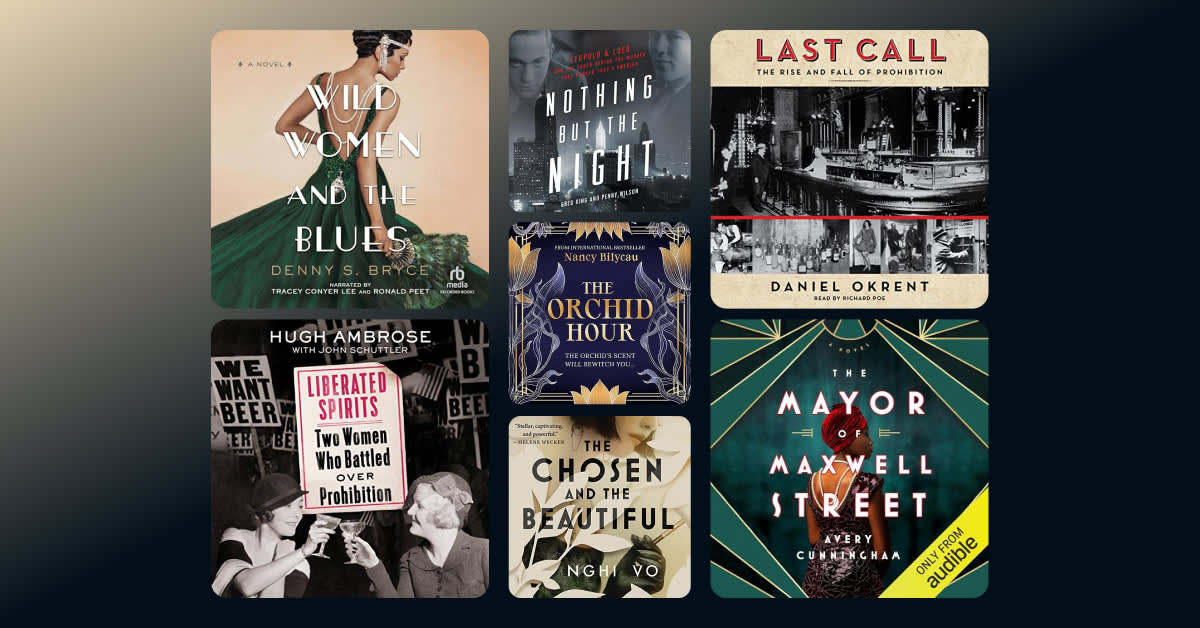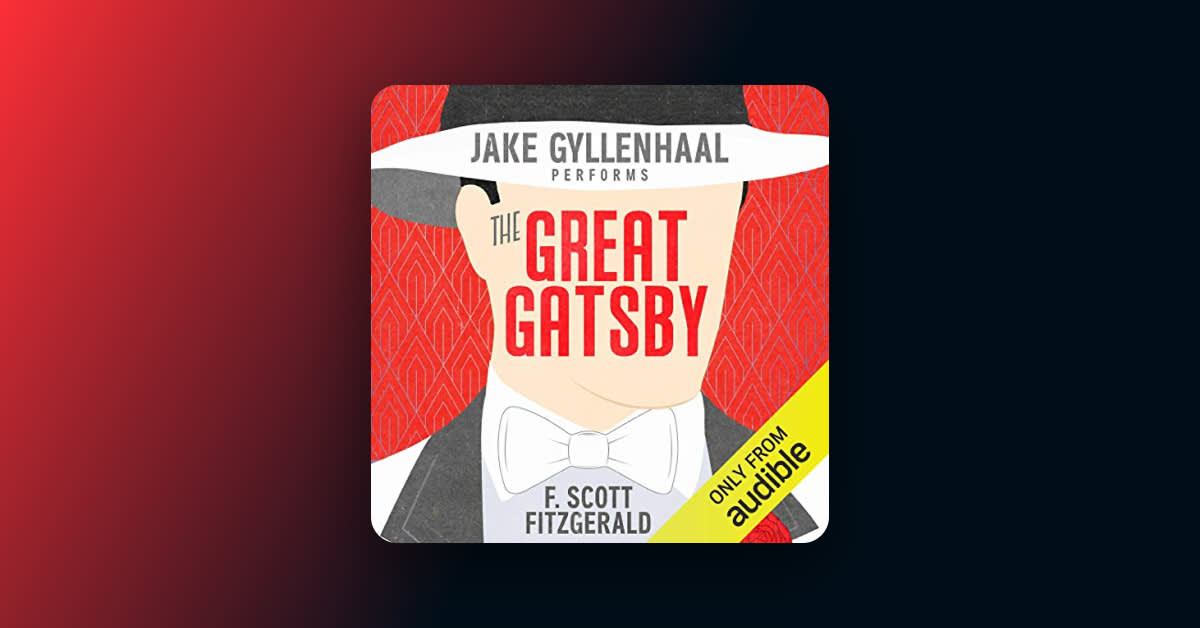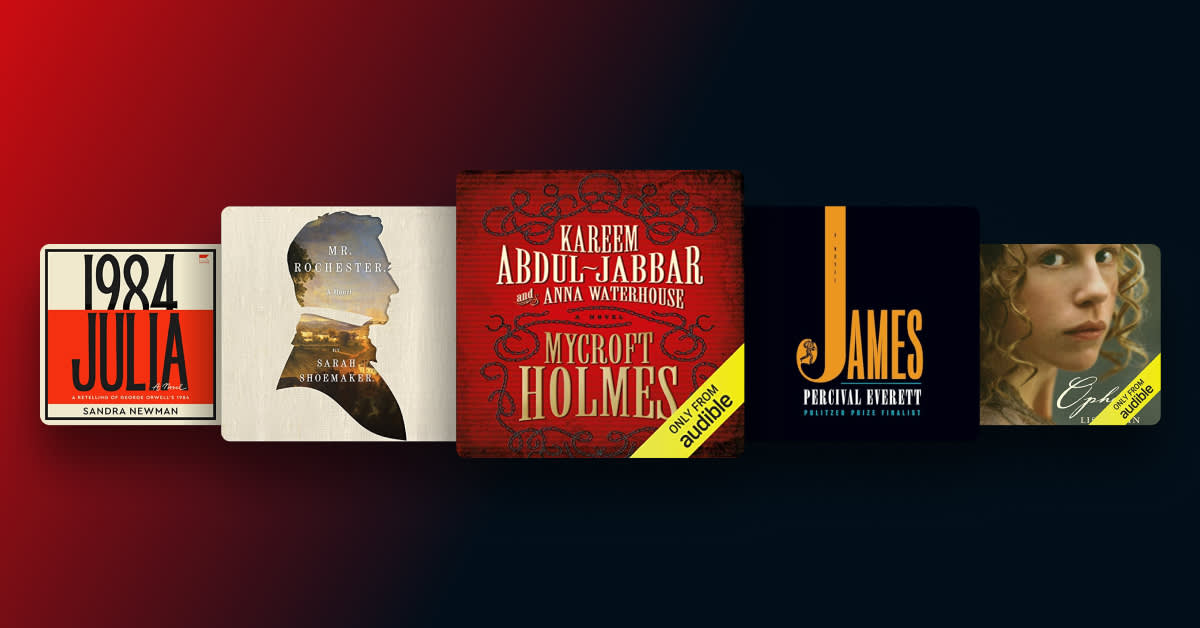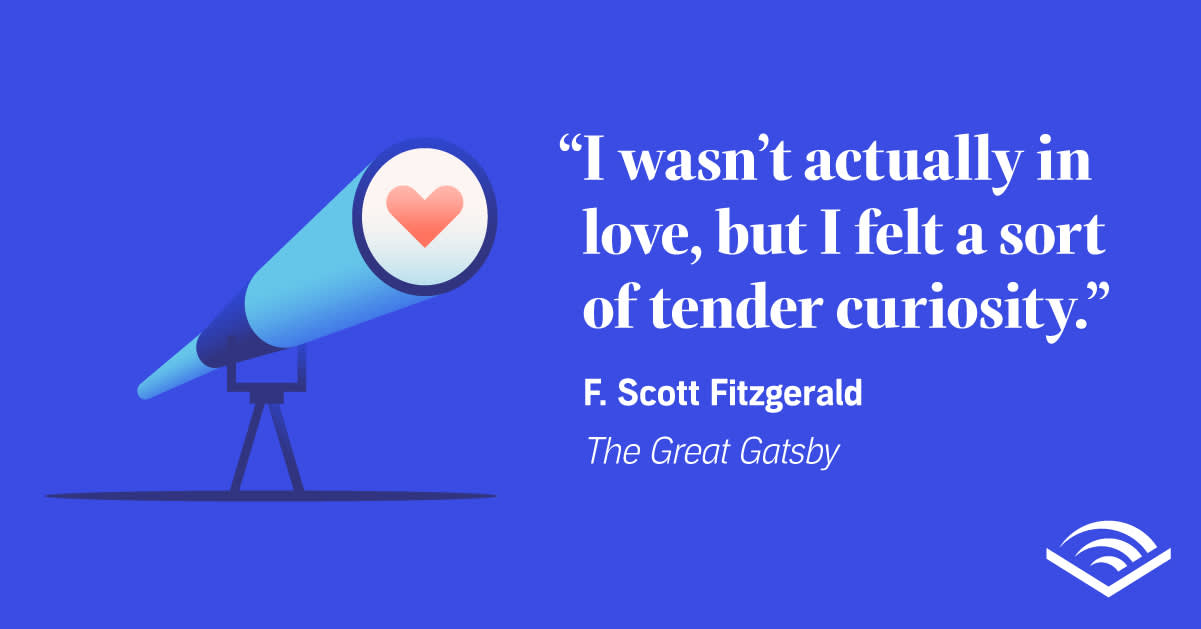“So we beat on, boats against the current, borne back ceaselessly into the past.”
Well over a decade has passed since the first time I read F. Scott Fitzgerald’s The Great Gatsby, and yet its last line remains indelible, an elegiac refrain so innately human, so attuned to our greatest pains and most fervent desires, that it was impossible to forget. It resonated with me at 14, reading a dog-eared school-issued copy punctuated with scrawled notes from generations of students before, and it hit me even harder at 21 when I reencountered Gatsby as the core text of a literature seminar focused on the Jazz Age.
Now, as Gatsby celebrates its publication centennial, I’m listening for the first time, and finding meaning anew in Jake Gyllenhaal’s understated, melancholic performance of an outsider’s observations on empty opulence and the impossibility of the American Dream. The novel’s themes are illuminated by Gyllenhaal’s remarkable narration, which you can hear for yourself in the audio highlights showcased here.

"Gatsby believed in the green light..."
Gatsby is frequently hailed as “The Great American Novel,” a moniker that emphasizes that the book is as significant as it ubiquitous. But despite the novel’s lasting legacy, its initial publication was rather underwhelming: Fitzgerald’s third novel was reviewed well by the era’s literary critics and contemporaries including T.S. Eliot, but its modest sales and misinterpretations meant Gatsby was a failure commercially. Tragically, it wasn’t until after F. Scott Fitzgerald’s death in 1940 that the novel’s perception shifted, soaring in popularity and garnering widespread acclaim in the years that followed.
This reassessed appreciation for The Great Gatsby expanded beyond literary circles after thousands of Armed Services Editions were printed and sent to American troops during World War II, increasing widespread readership. By the mid-1940s, the novel had captured the American imagination as Fitzgerald always hoped it would. As the 20th century gave way to the 21st, that renaissance would be rendered eternal by the novel's significance to American literature instruction in classrooms across the country. To this day, the story remains a staple—it’d be difficult to find a high school curriculum that didn’t include the book at least once on its required reading list.

"He had one of those rare smiles with a quality of eternal reassurance in it..."
In the 100 years since Scribner’s published The Great Gatsby, neither circulation nor adulation has receded. Authors have been inspired by Fitzgerald’s story and characters, crafting their own novels, while critics and historians continue to muse on what Gatsby has to say about both its author and its audience. Artists across mediums—from the big screen to the stage to video games—have imagined the tragic tale of Jay Gatsby time and again, and audiences have approached, analyzed, and assessed the story from every imaginable viewpoint. And the future of Gatsby is bright: The novel will no doubt enjoy countless more retellings, reimaginings, and reassessments following its 2021 entrance into the public domain.

"The truth was that Jay Gatsby...sprang from his Platonic conception of himself."
How lucky we are, a century later, to care so deeply about this book, and how fortunate we are still that some of our greatest thinkers, writers, and innovators have found something new to add to the conversation after all this time. From imaginative retellings to thoughtful historical and literary study, these listens add new meaning and fresh perspective.
Retellings and reimaginings of The Great Gatsby
A wholly original retelling of The Great Gatsby, Kyra Davis Lurie’s The Great Mann elevates the original story’s thoughts on class by centering the lived experience of a young Black veteran. It’s 1945 and young Charlie Trammell—much like Fitzgerald’s Carraway and Gatsby—has recently returned home from the war and is trying to regain his footing in civilian life. Charlie’s cousin invites him out to Los Angeles, and he finds himself in awe of the opportunity that awaits him there: a home free from the oppression of segregation, full of the richness of Black success and joy. It’s there that he meets James “Reaper” Mann, whose over-the-top, glamorous parties attract the likes of stars Lena Horne and Hattie McDaniel. Charlie is drawn into Reaper’s world, but as he finds himself growing closer and closer to this glamorous society, he also becomes keenly aware of rising tensions that threaten to destroy everything the community at Sugar Hill has built.
The world of Gatsby is one well-suited for a fantasy reimagining; all that glitz and glamour and intrigue beg for the allure of magic. Enter Nghi Vo’s The Chosen and the Beautiful, a novel that centers Jordan Baker, a secondary character from Fitzgerald’s novel who embodied the liberated New Woman archetype of the 1920s. In this iteration, she retains the wealth and golf skills from Gatsby but takes on a more expansive role as the protagonist of her own story, this time further complicated by an identity that puts her at odds with a xenophobic society. Here, Jordan is a queer Vietnamese adoptee, her existence often relinquished to the realm of exotic novelty. But in a world where so much is illusion, words left unsaid and con men manipulating the truth, it’s Jordan who can wield true magic. Audie winner Natalie Naudus breathes life into this dark, enchanting take on an American classic that’s as lyrical as the story that inspired it.
Jillian Cantor wields a mystery edge in her retelling of The Great Gatsby that begins where the original novel ends. It’s a summer day in 1922, and the body of Jay Gatsby has been found floating in a West Egg swimming pool. The social climber was shot dead in an apparent murder-suicide, the body of mechanic George Wilson found not far from the scene. But all is not as it seems, and when detectives uncover a hairpin near the pool, three women become suspects. There’s socialite Daisy Buchanan, formerly romantically linked to Gatsby; Daisy’s closest friend, Jordan Baker, harboring secrets long uncovered; and suffragette Catherine McCoy, sister to Myrtle Wilson, killed when she was struck by Gatsby’s car. Beautiful Little Fools offers a glimpse into the inner lives of the women of The Great Gatsby, elevated from side characters and love interests to dynamic figures with complicated backstories. An all-star cast of audio talent, including Cassandra Campbell, Julia Whelan, Elizabeth Evans, Brittany Pressley, and George Newbern, make this story truly sing.
There is no shortage of queer readings of The Great Gatsby—much has been written about the complex relationship between Jay Gatsby and Nick Carraway. In the YA retelling Self-Made Boys, that subtext is traded for a take on Gatsby that is openly, unabashedly queer. An entry in the Remixed Classics series, this listen follows 17-year-old Nicolás Caraveo, a trans boy from Wisconsin, as he reluctantly journeys to New York City in order to secure a future for himself and his family. When Nick arrives in West Egg, he quickly meets his enigmatic new neighbor, Jay Gatsby. Gatsby is a young trans man living in an opulent mansion where he hosts parties meant solely to dazzle his long lost love Daisy—who happens to be Nick’s cousin. But as Nick tries to help the pair reconnect, he finds himself hopelessly falling for Gatsby himself. A take on the novel that rejects tragedy for the sake of a story where hope and the possibility of love and belonging take center stage, Stonewall Honor recipient Anna-Marie McLemore’s dual-narrated, heartfelt historical romance is a fresh perspective on a long beloved story.
The star of this mystery retelling centers a Gatsby—just not the one you’re thinking. Greta Gatsby is Jay’s younger sister, newly 21 years old, freed from charm school, and ready to kick back her feet at the family mansion in West Egg. But when she arrives, her dreams of a relaxing summer are shattered when she sees her brother’s somewhat questionable friends—Daisy, Tom, Nick, and Jordan—have decided to vacation there too. Things get even more complicated, however, when one of those friends turns up dead, and everyone is a suspect. Greta decides to get to the bottom of it, uncovering all the scandals and secrets of 1920s socialite society along the way. A fun reimagining of Fitzgerald’s world with a sharp, smart amateur sleuth heroine at its heart, Claire Anderson Wheeler’s novel is a captivating listen made all the more endearing by Erin Bennett’s performance.
This forthcoming sci-fi retelling of Gatsby promises to be an inventive, effective, cyberpunk imagining of the story set within a dystopian New York City. In 2075, the metropolis is marked by intense wealth disparity: powerful businesses in enormous sky scrapers tower over the city’s failing middle and lower classes. Corporate cyberspace hacker Nick Carraway has just moved to the city, where he’s hired to look into secrets that charming, self-assured Jay Gatsby is determined to keep hidden. As he contends with the destructive, dangerous world of New York’s elite, Nick must decide where he really stands. Billed as an examination of the “guardrails of morality and the price of desire,” K.M. Fajardo’s take on Fitzgerald’s novel is sure to be as bold as it is timely.
There are countless audio editions of The Great Gatsby. Released in honor of the book’s 100th anniversary, this new version of the novel makes history as the only edition authorized by both the publisher and Fitzgerald’s family. The recording starts with an introduction from National Book Award winner Jesmyn Ward (Salvage the Bones, Let Us Descend) and a foreword from Fitzgerald’s granddaughter Eleanor Lanahan, opening the novel with thoughtful framing that emphasizes its importance in the literary canon. The text itself is updated with revisions from the author and performed with pitch-perfect skill by Juilliard-trained actor Seth Numrich. This special edition closes with an afterword from Professor James L. W. West III, who has written several scholarly entries on Fitzgerald and his works.
Nonfiction and criticism about The Great Gatsby
Jay Gatsby is a complicated character. Beneath the veneer of his glamorous lifestyle, enviable parties, and beautiful shirts, he’s an outsider, a new-money war veteran with legally dubious income streams. He’s been read as a con man, a romantic, an entrepreneur, and a criminal, and while it’s never explicitly confirmed how he amassed his fortune, it’s implied that bootlegging and ties to organized crime played no small part. But who is Jay Gatsby, really? That’s the very question that this intriguing Audible Original seeks to answer, digging into the life of real-life bootlegger Max Gerlach, an acquaintance of F. Scott Fitzgerald's who claimed to be the inspiration for the novel’s titular character. Reporter Joe Nocera and producer Poppy Damon dig into the details, investigating the story of who the real Jay Gatsby is, recounting Gerlach’s story and probing questions of the influences and inspirations apparent throughout the novel.
As much ink has been spilled on the character of Jay Gatsby, even more has been poured out for his multifaceted creator, the great F. Scott Fitzgerald. From literary biographies like David S. Brown’s Paradise Lost to collections of personal letters shared between Scott and his wife, Zelda, many writers have taken to chronicling the author’s life—from his complicated relationship with writing and success to the infidelities and acrimonious moments of his marriage. One recent such volume is Some Unfinished Chaos, a biography by essayist Arthur Krystal that paints a complex portrait of Fitzgerald that neither glorifies nor condemns its subject. Instead, Krystal examines a myriad of perspectives on Fitzgerald’s career and personal life, offering a wholly human look at a writer with a staggering reputation.
The Great Gatsby is often considered the quintessential novel of the 1920s, encapsulating the era’s cultural climate, moral pitfalls, and societal standards of class, beauty, wealth, and success. Among the reasons that Gatsby feels so fully realized is that so much of it was drawn from real circumstances, news stories, and experiences in F. Scott Fitzgerald’s own life and times. Narrated by fan favorite Kate Reading (known for her masterful performance of Robert Jordan’s The Wheel of Time series), Sarah Churchwell’s Careless People is built from biography, history, and archival materials, diving deep on 1922, the year in which Gatsby was set, shining a light on how socialites and criminals so often brushed elbows. Churchwell’s analysis reaches a fever pitch when it turns its lens on a scandalous double-murder that set off a media frenzy—and, the author posits, may well have inspired the tragic ending of The Great Gatsby.
The Great Gatsby has had an indelible impact on our culture at large—a fact further proven by how we simply can’t stop musing about the novel and its characters 10 decades later. Maureen Corrigan digs into our collective fascination with Gatsby, assessing the novel from a fresh point of view that encompasses everything from Fitzgerald’s literary history with crime fiction to the shores of the Long Island Sound. Corrigan uses her skills honed as a book critic for NPR’s Fresh Air to analyze the novel’s road to “classic” status and why its story—and the commentary surrounding it—still endure.
Released in celebration of The Great Gatsby's centennial, this Great Courses exploration of the novel and its perennial themes is essential for any listener seeking insight on why the story remains relevant. Sheila Liming, a writer and professor at Champlain College, guides listeners through a series of six engaging lectures focused on contextualizing Gatsby within the 1920s; examining the story as both a tragedy of lost love and a commentary on wealth, status, and privilege; assessing the novel's analysis of gender and sexuality; and why Fitzgerald's masterpiece has endured, remaining one of the most assigned novels in American high school classrooms for decades.
Contemporary listening on Gatsby’s themes
Though not strictly speaking a work focused on The Great Gatsby, the title of Sarah Wynn-Williams’s searing memoir, recounting her time in the cutthroat, morally dubious world of big tech, directly nods to a line from the novel, condemning old-money aristocrats Tom and Daisy Buchanan: “They were careless people ... they smashed up things and creatures and then retreated back into their money or their vast carelessness or whatever it was that kept them together, and let other people clean up the mess they had made.” And certainly much of Gatsby’s observations on greed, the illusion of social mobility, and the moral bankruptcy that accompanies unfettered wealth are perhaps more relevant than ever. In this buzzy, bombshell listen, Wynn-Williams shines a light on the realities of her time at Facebook, presenting a riveting, shocking portrait of a toxic workplace and the ruthless ambition of those at the very top.
A core theme of The Great Gatsby is the fallacy of a universally attainable American Dream. Fitzgerald zeroed in on the grim truth of many who pursue that dream, crafting a tragic figure in Jay Gatsby—a man who yearns for a love lost by immovable social circumstance. Journalist Alissa Quart offers a contemporary look at a facet of the American Dream as it exists today: that in order to achieve stability and prosperity, we need only “pull ourselves up by the bootstraps” and put in maximum effort—without ever asking for or accepting help along the way. Quart argues that an overemphasis on self-reliance in an era of increasing inequality can only result in crushing guilt and shame. In accessible, compelling language, Quart analyzes the cultural milestones that perpetuated this myth and what we can all do to forge a future that works for everyone.


























